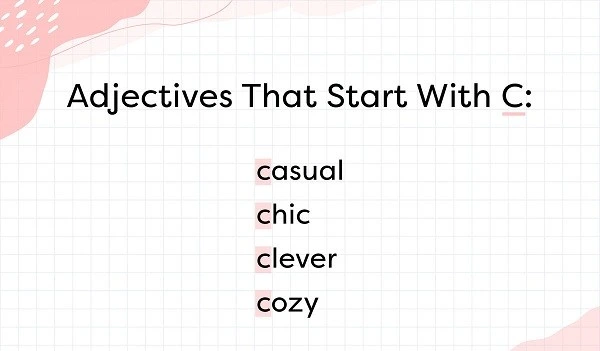Discovering 5 Adjectives Starting With C progress
Descriptive words with the letter ‘C’ play a fundamental situation in improving the striking quality and accuracy of our language. These descriptors, consistently settled inside the current sentence, transfer profundity and shade to our discussion. this article describes Adjectives Starting with C.
One normal class of ‘C’ modifiers connects with variety. For example, “blood red,” “cerulean,” and “chartreuse” inject our sentences with dynamic tints, permitting us to lay out a more distinctive mental picture.
These modifiers inspire feelings and tangible encounters, enhancing the depictions of articles and scenes. Envision a ‘ruby nightfall’ or a ‘cerulean sea,’ and you’ll in a flash handle the visual excellence they convey.
Moreover, ‘C’ modifiers are likewise adroit at conveying size and amount. “Giant,” “reduced,” and “innumerable” are incredible models. They assist us with accentuating the immensity of an item, its proficient size, or the sheer overflow of something, all inside the current sentence.
In the domain of the normal world, ‘C’ descriptors frequently portray the environment and conditions. “Cold,” “overcast,” and “quiet” summon unmistakable climatic states, making it simpler to examine climate or put things in place in a story.
Generally, modifiers starting with ‘C’ are flexible instruments that engage us to make more enlightening, bright, and nuanced sentences. They paint pictures, uncover character attributes, measure protests, and portray natural circumstances. In the current sentence, these modifiers advance our correspondence by adding layers of importance and profundity to our words, making our language really captivating and reminiscent.
Caged
History
The descriptor caged has starting points in the Center English word “confine,” which alludes to a fenced-in area for limited creatures. By and large, confines were utilized in different settings, from catching creatures to detaining people.
Evolution
Today, caged describes a state of confinement, restriction, or feeling trapped.
Uses
- Caged animals are often found in zoos, where they are kept for educational purposes.
- Metaphorically, feeling caged can refer to a sense of confinement in one’s life or circumstances.
- In literature and art, caged symbolism may represent themes of captivity and freedom.
Cagey
History
The term cagey is believed to be derived from the word cage, suggesting wariness and evasiveness. Historically, being cagey meant being cautious or secretive. You can also check the full list of adjectives that start with C with their complete biography.
Evolution
Today, “cagey” describes someone who is shrewd, cautious, and skillful in avoiding disclosure or commitment.
Uses
- A cagey negotiator is adept at protecting their interests while revealing little information.
- In detective fiction, cagey characters often hide important clues or information.
- Being cagey in a conversation might involve avoiding direct answers or commitments.
Calamitous
History
Catastrophic has its foundations in the Latin word “disastrous,” signifying “grievous” or “unfortunate.” By and large, disasters were occasions set apart by extraordinary trouble or fiasco.
Evolution
Today, calamitous describes anything disastrous, catastrophic, or causing great harm.
Uses
- Natural disasters, such as earthquakes and hurricanes, can have calamitous effects.
- A calamitous decision or event can lead to widespread consequences and suffering.
- Calamitous events in history often shape the course of nations and societies.
Calculable
History
Measurable is derived from the Latin word “calculabilis,” signifying “ready to be determined.” By and large, calculability is connected with the achievability of mathematical calculation.
Evolution
In contemporary language, “calculable” describes something that can be estimated, predicted, or quantified.
Uses
- In scientific research, calculable data are essential for making hypotheses and drawing conclusions.
- Calculable risks are assessed in fields like finance and insurance to inform decision-making.
- You can use it as a calculator based on known variables.
Calculated
History
Calculated also comes from the Latin “calculatus,” meaning “reckoned” or “computed.” Historically, you can use it in various fields, including mathematics and astronomy.
Evolution
Today, “calculated” describes actions or decisions that are carefully planned, deliberate, and based on strategic thinking.
Uses
- You can use it as a careful consideration of potential outcomes.
- In personal relationships, calculated actions may involve strategic choices to achieve specific goals.
Calculating
History
Calculating shares its origin with “calculate” and has a history rooted in mathematical and numerical contexts.
Evolution
In modern language, “calculating” describes someone who is shrewd, cunning, and skilled at planning or manipulating situations for personal advantage.
Uses
- A calculating individual may use strategic thinking to gain an upper hand in negotiations.
- In literature and film, calculating characters are useable as crafty and scheming.
- Calculating behavior may involve careful analysis of social dynamics and power structures.
Callous
History
Callous adjectives have their origins in the Latin word “callous,” meaning “hard” or “thick-skinned.” Historically, callousness refers to having an insensitive or unfeeling attitude.
Evolution
Today, “callous” describes someone who is emotionally insensitive, unkind, or indifferent to the suffering of others.
Uses
- A callous remark or action can hurt or offend others due to its lack of empathy.
- You can use it in interpersonal relationships and workplaces.
- Developing empathy can help reduce callous attitudes and promote understanding.
Calm
History
The word “calm” has historical origins, with roots in antique English and vintage high German, referring to a state of tranquility and serenity.
Evolution
In modern language, “calm” describes a peaceful, composed, and unruffled state of mind or environment.
Uses
- A calm individual remains composed and unflustered in stressful situations.
- Creating a calm atmosphere is conducive to relaxation and well-being.
- Calm seas and weather are ideal for safe navigation and outdoor activities.

